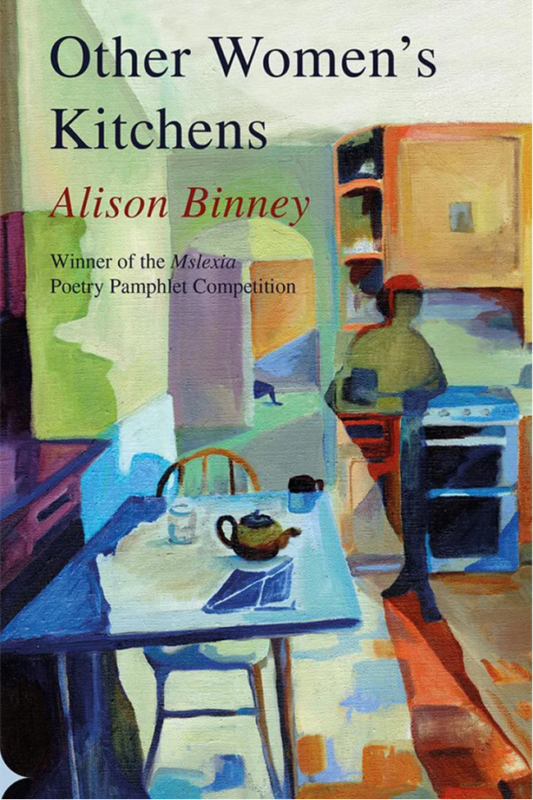REVIEW: ALISON BINNEY’S ‘OTHER WOMEN’S KITCHENS’
By Stella Backhouse

Alison Binney’s 2021 Myslexia Award-winning pamphlet Other Women’s Kitchens is a refreshingly relatable description of one woman’s journey from awkward teenage awareness of her ‘difference’ to maturity and a relationship so right, it feels like she and her partner are carved from the same tree. Because the specific impetus for Other Women’s Kitchens is lesbian identity, it would make the perfect gently supportive gift for a young person who is struggling with their sexuality. But the extendability of Binney’s themes to anyone who has ever felt, for any reason, that they don’t fit in, as well as her accessible focus on the familiar and the everyday, also makes it an instructive read for those who are new to poetry and interested to explore its potential to fashion the extraordinary from the ordinary.
One technique Binney uses to achieve this herself is by destabilising the familiar so that it becomes not a place of security but a terrain fraught with anxieties. The hinge is the idea of ‘knowing’. Do other people know that Alison fancies girls? What would happen if they did? These fears are brought to life in a number of poems about adolescence and early adulthood, when routine experiences morph into obstacle courses strewn with traps – any one of which could trigger exposure. In ‘Colin arrives in Albert Square’ for example, a comfy evening on the sofa stiffens into acute self-consciousness with the entry of EastEnders’ first gay character. Binney’s feeling that she has “a python on my head” is accentuated by the nervous flicking of her attention between the screen and the reactions of the family-member she is watching with. Invisibility becomes her safe-space. In ‘Haircut,17’ it is subjected to the unwelcome invasion of close professional scrutiny: “she asks how much are we taking off today/and I hear how much of a lesbian are you”. When the haircut is completed she looks in the mirror and concludes that “I’ve got away with it this time/when I look I’m hardly there at all”.
Fear of other people’s knowing is set alongside Binney’s internal knowledge of herself. The pamphlet’s opening anaphora, the schooldays-set ‘The way you knew’ queasily slides from the comforting certainties of “the way you knew your own coat in the cloakroom the way you knew/as you chewed how big the next bubble would be” to the juddering full stop of “the/way you knew for sure that if anyone knew about you you were dead”. In adulthood, knowing assumes a more positive aspect. Its title a quietly triumphant riposte to that of the opening poem, ‘How we knew’ is a celebration of the moment Binney and her partner realise that they are right for each other: “Then you knew, and I knew and the evening/stretched before us, the air fat with so much/knowing that it hurt to breathe, and I didn’t know/what to do, and neither did you, until, somehow/we did”.
Other Women’s Kitchens is not an overtly angry collection. The homophobia it documents is never physically violent. Rather, it is wielded through that quintessentially middle-class weapon: words. The found/concrete poem ‘Testimony’ and the more personal ‘When I say partner and you say friend‘ are both excruciating examples. Neither is this a collection that particularly challenges conventional narratives of bourgeois heteronormativity: Binney’s aspiration is not to overturn the socio-political order but merely to be ordinary – openly enjoying the same kind of fulfilling and enduring monogamous relationship that has, at least in theory, always been open to heterosexual people. That said, Binney’s is an endearing story endearingly told. The strength of her work lies in its ability to capture, in the early poems, the excruciating discomfort of existing on the boundary between competing discourses at a point in your life when you don’t even know what competing discourses are; and in the later poems, the maturity and resolve to confront it and find a place to call your own.
Other Women’s Kitchens is currently out of stock at Seren Books but available online from the Poetry Book Society and other retailers.
